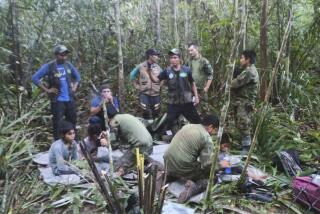Philippines elections marred by violence, voting-machine glitches
Tens of millions of Filipinos flocked to the polls Monday to elect a new president amid widespread violence and flaws with ballot-counting machines that many blamed on the corrupt politics that has plagued the archipelago under outgoing President Gloria Macapagal Arroyo.
Officials confirmed election-related violence at more than 80 polling places nationwide including bombings, shootouts, abductions and the burning of voting machines. At least a half-dozen people were killed and eight were wounded, they said.
“We certainly don’t want it, and as a Filipino I know it’s a terrible thing, but unless something is done to change the system and get these people afraid of the law, it’s going to happen again and again,” said Rod Severino, head of the Asean Study Center at the Institute of Southeast Asian Studies in Singapore.
At many polling places, voters waited more than five hours in humid 100-degree heat to cast their ballots, with many eventually giving up in despair. Officials expected a turnout of more than 50 million voters out of a population of 90 million citizens.
Elections officials extended voting for one hour until 7 p.m. after reports that new optical scanning machines used for the first time had broken down in more than 300 of the nation’s 76,000 precincts. Many had requested that polls remain open three hours after that.
Presidential frontrunner Sen. Benigno Aquino III was one of many who had trouble casting his ballot when a machine malfunctioned in his hometown of Tarlac, north of Manila. Aquino showed up at 10 a.m., but did not cast his vote until five hours later.
“This should not have happened,” he said. “I hope this is an isolated case.”
It was not. A software problem in the machines was discovered a week ago and nearly postponed the election. Many voters wished the ballot casting had been put off.
Volunteers manning polling places used ingenious methods to unclog voting machines jammed by crumpled ballots. One Manila TV report showed volunteers using broom handles, the tip of an umbrella and even ballpoint pens to dislodge ballots.
“I interviewed people who had waited for four hours to vote and were still nowhere near the front of the line. The electronic voting systems seem to be creating as many problems as they are solving,” said Lincoln Ellis, a volunteer for a group called The People’s International Observation Mission.
“I received a report that in one precinct, only 22% of the ballots were accepted by the electronic voting machines as of 9:30 a.m. this morning. The polls’ capacity is only a fraction of what is necessary to allow everyone to vote.”
Many towns were not able to hold elections because of the balloting machine problems and violence. Special elections to be held in many of those areas means voting results will be delayed.
Former Commission on Elections Commissioner Resurreccion Borra said: “One thing is sure, with the malfunction of so many of those machines, the results of the elections will be affected.”
Analysts said that violence was typical of Philippine elections.
In addition to Monday’s death, campaign-related violence has killed more than 30 people in the past three months. The last election in 2007 saw more than 125 people killed.
“It’s lawlessness that’s getting people killed,” Severino said.
As usual in a nation where the rich and famous often run for political office, the ballot was filled with well-known names -- including Manny Pacquiao, 31, a seven-time world boxing champion who is seeking a Lower House seat, and Imelda Marcos, 80, the former first lady who ruled with her late dictator husband Ferdinand Marcos. She is also seeking a Lower House seat.
Aquino, the son of the late democracy icon Corazon Aquino, is expected to replace Arroyo, whose tenure has been marred by allegations of graft and election fraud.
Vanzi is a Manila-based freelance writer
More to Read
Start your day right
Sign up for Essential California for news, features and recommendations from the L.A. Times and beyond in your inbox six days a week.
You may occasionally receive promotional content from the Los Angeles Times.







